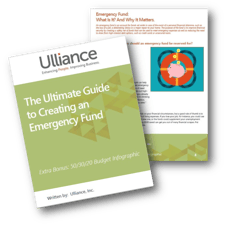Have you ever wondered why you use money in a particular way?
Achieve Financial Wellness During the Pandemic & Beyond.
We posted this at the beginning of the year but with everything that has been happening over the last 6 months, we thought it may be a good idea to pull this one from the vault + we added some COVID cash saving tips and a quick video. Enjoy!
Want to make more money? Think differently about it. If that sounds too easy, it's because it's easier said than done! But it is a key to creating financial stability.
Our relationship, our feelings and thoughts about money, start in childhood. If you were fortunate enough to be born into a financially stable and fiscally responsible family, you probably picked up on some healthy notions about money. You probably learned the value of saving, were encouraged to develop delayed gratification, and maybe as you matured, you learned about the secrets of compound interest and eventually, how to invest.
 Need some inspiration?DOWNLOAD this
Need some inspiration?DOWNLOAD this
Ultimate Guide to creating an Emergency Fund! 💰💵
Learning (or unlearning) money habits frequently requires an assessment of how you feel about money.
Talking to a counselor about your history with money can help reveal hidden barriers to your financial success. Figuring out your feelings and how to manage them in a positive, alternative manner FIRST will help make better use out of financial counseling you may receive.
Once the destructive feelings have been neutralized, consider trying some of these tips below to begin your financial wellness journey.
7 FINANCIAL WELLNESS TIPS:
1. Don’t put it off
Identify and address any financial problems before they start. Develop a system for keeping your financial records in order. Items like receipts, pay stubs, tax records, banking and insurance information and any other documentation that is relevant to your financial situation should be stored securely and easily accessible.
2. Keep an organized record of your finances
Review your purchases. Make adjustments if you notice expenditures not aligned with your budget. For example, if you are spending money on daily coffee or if you are eating out more than cooking at home, making small behavioral changes in these two areas can get you and your budget back on track.
3. Automate your savings
Always pay yourself first. An easy way to do this is to set up an automatic deposit or transfer into a separate account. Treat it like any other bill and make a regular monthly payment toward it.
4. Build your savings
Emergencies are inevitable. Your savings account is the helping hand you are looking for when the need arises. A good rule of thumb is to have a minimum of six months of income stashed in your savings.
5. Plan ahead and set budget goals
Your goal is to develop a budget based on your monthly income, expenses and savings, and then live within your means. Should a shortfall occur, choose to adjust your budget rather than rely on a credit card. If your budget cannot be adjusted, your savings will need to cover the expense but work hard to get back on track the following month.
6. CURB YOUR AMAZON TRIGGER FINGER
It is so easy to go wild on Amazon and buy things with just a click. Oh and the joy when you hear the Amazon truck in front of your house! BUT it can get out of hand. Try this. Really look at your account and see (yikes!) how much you have spent. Now that you are stunned, make some rules. Only allow yourself to shop on certain days at certain times. And pause. When you are ready to buy something, put down your phone and go do something—like empty the dishwasher, fold clothes, go for a walk. Then come back and decide if you really need the items in your cart.
7. CUT DOWN ON THE TAKEOUT
Well at first, we were all forced to cook at home, but now some of us may just be over it or have gone completely crazy ordering takeout—just because we can (it's fun + easy). Try to limit your takeout to a couple times a week. Next, look for coupons. Restaurants are getting really creative to draw in business, so do your homework and save some cash.
Organizations that realize that the financial health of a business is directly tied to the physical and emotional health of their employees turn to Ulliance Life Advisor Wellness programs to help staff members improve their health. For every $1 you invest in a wellness program, you can save $3 to $5 in health care costs—and your employees reduce risk behaviors such as smoking and overeating. How can we help you? Visit www.ulliance.com, or call 866-648-8326.
NOW IS THE TIME to get your finances in order. start with our emergency fund guide to get on track!


